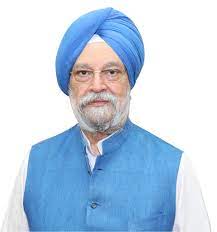It’s a collection of essays, with the foreword by Amitabh Bachchan.
Cabinet Minister Hardeep S. Puri has edited an anthology to celebrate 100 years of Delhi University. The book is titled: “Delhi University, Celebrating 100 Glorious Years” (Rupa Publications). It has contributions by former vice chancellor Dinesh Singh, Shashi Tharoor, Sanjeev Sanyal, Kiren Rijiju, Justice Chandrachud, Lakshmi Puri, Arnab Goswami, Imtiaz Ali, Raian Karanjawala, Bibek Debroy, Meenakshi Gopinath, Namita Gokhale, Vijay Shekhar Sharma and one by Hardeep Puri himself. The foreword is by Amitabh Bachchan, whom Hardeep refers to as “the oldest alumnus in the list and also the most revered”. While Bachchan wrote about his time at Kirori Mal College (more about campus life than academics), Justice Chandrachud spoke about the university’s emphasis in teaching people how to think and not just “merely learn”. After reading the last point I confirmed that my hunch was right, that Justice Chandrachud is an ex-Stephanian because that college places a high value on not just the classes but also the tutorial sessions (inspired by the Oxbridge system) that happen in batches of four where students are encouraged to give their own interpretations of the work at hand. Justice Chandrachud also talks about the joy of campus life, of visiting the Tibetan Dhaba (Tib Dabs) at Majnu Ka Tila and of course about guzzling nimbu paani at the college dhaba (of Rohtas fame) and eating scrambled eggs at the college cafe.
Sanjeev Sanyal talks about how the university grew from just a handful of colleges (three) and 750 students to one of the largest and most prestigious universities in India. Tracing the history of the university, which was established in 1922, Sanyal takes us through how it was impacted by the Freedom Movement, the Emergency Days, Mandal agitation and also the Covid times, for as he says, Zoom calls cannot replace the campus experience.
Lakshmi Puri talks about her time at Lady Shri Ram College, busting the myth that “from having the image of a college come-lately begetting nerds at best to behenjis at worse, LSR assumed a pride of place by combining a reputation for academic excellence and topping university exams”. And adds how it felt like a badge of honour when matrimonial advertisements asking for fair, lovely and pliant brides, added a last line—”LSR Girls need not apply”. As her husband Hardeep Puri writes in the foreword, though he and Lakshmi studied at the university at the same time, the distance between the North and South Campuses meant that they never met while in college. Hardeep studied at Hindu College, though he went on to teach at Stephen’s (a college which had rejected him during the interview process). It is with a certain sense of irony—and lots of satisfaction—that he mentions both facts in his essay.

Raian Karanjawala, the go-to-legal counsel for Lutyens Delhi, had joined SRCC in 1972 right on the eve of the Emergency. As he says, the predominant political debate of the time was: Were you with Indira Gandhi or against her? “At the time,” writes Raian, “the politics of the University—as also of the country—roughly translated into Congress vs the rest. St Stephen’s College and to a lesser extent, Hindu College, were representatives of the liberal school of thought, whilst SRCC, which had a 70:30 split in favour of the government schools, was a bastion of the ABVP.” In fact, it was during his college days that he first met the late Arun Jaitley, who was then canvassing for the college union presidentship. “And with a handshake he earned my vote and a lifelong friendship,” reminiscences Karanjawala.
St Stephen’s most famous calling card, Shashi Tharoor sums it best when he writes that “When I look back at DU, I celebrate the secularism, the pan Indian outlook, the well-rounded education, the eclectic social interests, the questioning spirit and the meritocratic culture that are the vital ingredients of the Stephanian ethos.”
For all those who went to Delhi University—and even for those who didn’t—the book is a compelling read, for it captures a certain essence and an idea that is at the core of what India stands for. Kudos to Hardeep S. Puri for finding time between overseeing the Central Vista redesign and negotiating the Russian-Ukraine oil diplomacy, to put together this collection.

